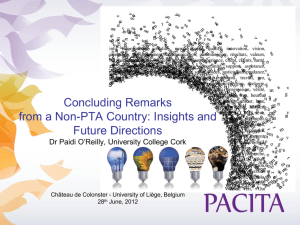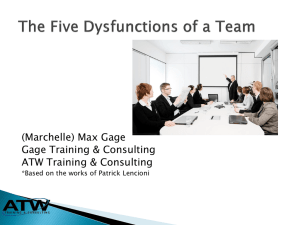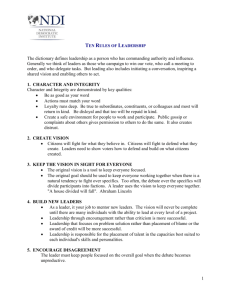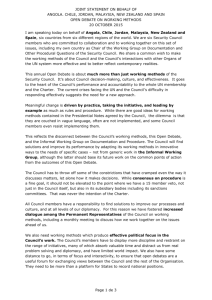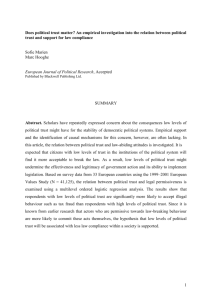Social justice through service provision and advocacy
advertisement
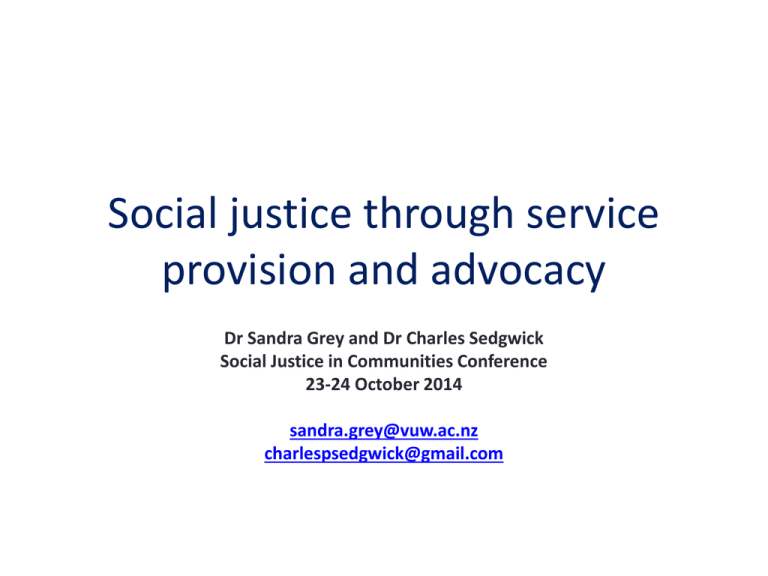
Social justice through service provision and advocacy Dr Sandra Grey and Dr Charles Sedgwick Social Justice in Communities Conference 23-24 October 2014 sandra.grey@vuw.ac.nz charlespsedgwick@gmail.com The sector and democratic debate Our question How is democracy – as measured by the involvement of the community and voluntary sector in public debate and policy making – faring? The sector and democratic debate • Comparing data from two surveys conducted in 2008/09 and 2013/14 • Quantitative and qualitative analysis 447 and 597 participant statements for first and second surveys respectively • 93 participants from around New Zealand Full time staff as at 2013-14 None 27 1 to 2 21 3 to 10 20 11 to 19 7 20 to 50 6 100-300 10 900 1 Blank 1 Field of provision Advocacy Education Health Housing Philanthropic Social service Total Total number of respondents per field of provision 21 4 14 2 1 51 93 Percentage of total respondents 22.6 4.3 15.1 2.2 1.1 54.8 100 Distribution of paid staff in social service nonprofits by field, 2004 (%)* 2.9 27.5 20.3 5.8 1 43.5 * Adapted from The New Zealand non-profit sector in comparative perspective (p.16) J. Sanders, M. O’Brien, M. Tennant, S.W. Sokolowski & L. M. Salamon, 2008. Wellington: Office the Community and Voluntary Sector. The sector and democratic debate Have you been involved in government consultation processes over the last term of government? 2008-09 2013-14 Yes 80 79 No 16 22 N/A 4 0 TOTAL 100 100 Attitudes of governments to debate, 1999 to 2013 “Debate is tolerated” [Under Labour] There was not a great fear that speaking out … would be “punished” by for example loss of contracts. However there was not a total encouragement of debate either, e.g. all the fuss about “advocacy” in 2005. [Under National] There always seems to be a subtext of ‘already made our minds up but we will listen to appear like ‘the good guys’. “It’s getting harder to challenge” Negative Change No Change Advocacy Education Health Housing Philanthropic Social Services Total 33% 25% 29% 50% 100% 27% 30% 48% 50% 64% 50% 0% 61% 57% Positive Change 14% 25% 7% 0% 0% 12% 12% Dissenting organisations are valued 20008-09 5 2013-14 22 Disagree 47 55 Agree 27 15 Strongly agree 1 1 Blank 14 5 N/A 5 2 Total 100 100 Strongly disagree Dissenting organisations are valued [Under National] This particular government does not seem to listen or take into consideration any conflicting opinion or EVIDENCE contrary to its outlook… If they continue to “high handedly” proceed with actions and policies without REAL consultation or regard to social or environmental consequences it will be a big turn off & people become disengaged with our democratic system. Getting key concerns heard Labour-led Government 1999-2008 Not successful at all Moderately successful Highly successful National-led Government 2008-2013 4 68 23 38 53 3 Getting key concerns heard? Change driven by Ministers who listen to vested interests of industry too much. Public servants follow orders – do not/are not able to act as advisors. [Our influence has been] more in implementation than in major policy topics – e.g. MSD funding processes – we have influenced decisions about changed processes. Review of incorporated societies / Development of accounting stats. Contracts that constrain Gag clauses • 12.9% of the 2008/09 respondents • 25.8% of the 2013/14 respondents. [It’s] contractual. Must seek departmental sign-off before speaking up about the contract, the contract negotiations, or the work. We are not allowed [to make] public criticism. Dissenters risk their funding 2008-09 2013-14 Strongly disagree 7 1 Disagree 32 27 Agree 42 40 Strongly agree 5 18 Left Blank 11 8 N/A 3 7 Total 100 100 Dissenters risk their funding …removed from appointments/committees after media article critical of government policy (unrelated to [the] committee). Funding not renewed after criticising. Government actually threatened to immediately cease funding us if we proceeded with a discussion document with the purpose of establishing some shared understanding between all Social Service Agencies. … we are very cautious about what we say publicly as we cannot afford to lose our funding. Lack of space and respect Government pushes too many things through under urgency – denying proper process. Poor facilitation of reference group. Obfuscation, delays in documentation. Less frequent meetings than expected. Broken promises from officials. Funding from MOH, MSD, is based on no negotiation ... Take it or leave it, our way or no way. Consultation was: “this is what we require – how will you measure.” Lack of resources NGOs are being requested to take more responsibility and give “more for less.” NGOs used to refer clients to Government Department’s now it is the opposite. Government policies are not well thought through and NGOs are left to pick up the pieces. Lack of certainty NGO’s suffer from uncertainty over their future because of short term funding model used / Excessive resources involved in seeking & maintaining funding / by economic necessity focus on short term project work rather than long term change. The bigger picture Attitudes to democracy in New Zealand encouraged public debate The New Zealand media provided a forum for a range of perspectives in public policy debates 2008-09 2013-14 Agree 70 42 2008-09 2013-14 Disagree 46 47 Agree 38 41 What does it all mean? Democracy is constantly being undermined and decisions are being manipulated/negotiated behind closed doors by key power-holders. There is a climate of intimidation and management so that ministers only hear “good news” as far as possible… There is also a narrow focus on short term measured targets at the expense of other health measures that are as important. What does it all mean? • Intolerable and untenable environment • Plagued with contradictions which damage the sector Where to? • • • • • Work out core messages for engagement Make demands and define yourselves Seek a review of the Charities Act Seek to change what is ‘counted’ Public support crucial
